Sara, she/her, Senior in HSWelcome to my journey to productivity! *I do not own the icon/header image*
Don't wanna be here? Send us removal request.
Text
Back To School Tips Master Post!
I had a few people asking me to do a back to school tips/ how to do well in school post so here it is. I’m a sophomore in college and an honors student so I plan on sharing the things that have helped me succeed. Even though these tips are things I use now in college, most of them I also used in high school so it can be applied there as well.
Organization The most beneficial thing you can do is stay organized.
Get a planner.- I bought mine this year at Walgreens for around $7 but it has a plastic cover so all paper ones are even cheaper. A planner is good for keeping track of when everything is due. When I get my syllabi for my classes I go through them and write down the due dates of homework, essays, tests, etc, on the day they are due. You can color code your classes or just write the class next to the assignment. This way you can look at a whole week and see everything you have due for all of your classes in one place. It’s also easier to add in things or make changes if your professor decides to due so.
Use a white board- I know white boards can be expensive, so if you can’t afford one, expo markers will write on laminated paper which you can get for around $4 on Amazon. I use this to keep on my wall and write the next really important date for each class. So I have all my classes listed on the board and let’s say my next big date in Psych is a test. I’d write that date on the board, then after the test, I’d erase it and write the next important date. These dates should be in your planner as well but it’s nice to have them right in front of you at all times so you don’t turn to the next week in your planner and realize you have a test on Monday.
Buy durable folders- If you’re going to be using your folders all year make sure they’ll last all year. You want to lose any of your assignments. I get plastic folders at Office Depot for $0.39 a piece. I chose a color for each class and write the class at the top in sharpie and I’m good to go!
Notebooks too!- You’re going to be taking a lot of notes so make sure to keep a notebook for each class as well. Mine were $3 each at Office Depot but they have a plastic cover so if you need to save some money get the paper covers because you most likely wont reuse a notebook.
Get a pack of loose leaf paper- Sometimes you have to turn things in and if you’re like me then you hate tearing it out of your notebook. But if you don’t have a problem with that then don’t worry about it!
Use some sort of bag/backpack- This will help you not lose anything plus you can put water, snacks, etc in it as well!
Study Tips Tests are often the biggest portion of your grade so knowing the best ways to study will help you out the most.
Figure out what type of learner you are- This can greatly improve your study skills. There are visual learners; these people learn best with charts, graphs, and anything that show a visual relationship between information. So if you’re this type of person, to help study you could make charts, graphs, tables, draws arrows between points of information, or watch videos. Anything to help you see it. There are also auditory learners; these people learn best when hearing the information. So the best way for these people to study is to recite information out loud, or if your course has an audio book to listen to it. You could also have a friend read information to you and you say it as well. Some people are reading/writing learners; they do best when reading the text and writing down important points/taking notes. This is the type of learner I am so to help me study, I write out my own flashcards, I copy power points into my notes, and as I read my chapters I write the important information. Something else that is good for these kind of learners is to make little quizzes for yourself. There are also kinesthetic learners; they learn best with more hands on activities. This can be hard to do especially with some subjects. If you can physically do what you’re studying then do it. If not, make a game out of it. For example, ask yourself questions and if you get it right take a shot at a basketball hoop or a soccer goal (if you don’t have these things use a paper ball and your trashcan or anything you can substitute. Figuring out which learner you are will greatly improve how you study.
Don’t wait until right before a test- Cramming your brain with all the information a few days before a test will not help you remember and only stress you out. This is called Massed Practice and is proven to be a waste of time and information is not retained well. Study a little everyday or every other day. This is called the Spacing Effect and is proven to improve retention and recall of information. So it is best to do short sessions of study over a long period of time rather than a long session all at once.
Find a good place to study- If you like quiet places and your house/dorm is too loud go to a library or outside if it’ s a nice day. If you like a lot of background noise play some music or go to a coffee shop.
Overall Tips These tips are still really important but I don’t have enough that fit together to make another header.
Work on what’s due first- Some people think it’s always best to work on the important things first but that’s not always the case. If your essay is due in two weeks and you have an assignment due in a few days then finish the assignment first. You’ll still have plenty of time for your essay. I suggest doing all your work but if something happens to where you just can’t then yes do the more important thing because it’ll be a bigger part of your grade.
Writing Centers- A lot of colleges/universities have writing centers. If you’re not the best at writing or just need some help you can make an appointment at the writing center where someone highly qualified in writing will read your paper/essay and help you with grammar, punctuation, idea flow, overall organization etc. I highly suggest checking to see if your school has one of these.
Check your email/Blackboard/whatever your professor uses- This is where they may add extra assignments/ cancel class and not mention it in class. It’s always important to check.
Try to relax- I know it can be hard, especially for students with depression, anxiety, and other mental/physical illnesses but it’s important to always take a moment and calm down. Take breaks from your work and do something you enjoy for at least a few minutes everyday. If you need a nap, take a nap. just set an alarm to pick back up on your work later.
Don’t worry about being perfect- This is still something I’m working on myself but getting better at. Last semester I got a B for the first time since my sophomore year of high school and it bothered me to no end. But, I told myself I did my best, and as a person with bad social anxiety I’m okay with my B in public speaking. So for anyone else who feels like they have to keep their 4.0 all 4 years, don’ t panic if you don’t. There’s nothing wrong with not being perfect, almost no one graduates college with a 4.0. Always do your best, but don’t put too much pressure on yourself. I cannot stress this enough.
Take classes you enjoy- Hopefully you’re in a major that you enjoy so you wont hate your classes too much but it’s still important to try to take a fun class every once in awhile. If you like art, take an art class. Then, you’re still doing work but also doing something you like.
Get a tutor- If you’re not doing as well in a class as you would like, don’t be afraid to get a tutor. Most universities offer tutors who are students that would love to help you and wont be judgmental at all. There’s nothing wrong with getting a little extra help and tutors are often people who have already passed the class with an A so they’ll be very good resources.
Take care of yourself- Overall, make sure you’re eating well and drinking water throughout the day. Sometimes it’s impossible, but try to get enough sleep. If you go out to party watch out for yourself and others. Practice self care and if things get too stressful and you need help don’t be afraid to ask.
I know this post is very long, but I wanted to share everything I could for anyone who wanted help. If I think of anything else I’ll definitely add it later. I hope everyone has a great semester and school year! Good luck to everyone!
5K notes
·
View notes
Text
tips on how to organise your study sessions
Hi guys! So quite some time, i asked you guys if you were interested in some tips on how i manage to stay concentrated for a long time period and how i prepared for my exam season - writing 4 exams in 1 month when i haven’t written a real hard exam in 2 years. It was not that easy, but i managed to do okay. I passed all of them so far - which is cool for me, because they were exams in business class, and i usually don’t have business classes. Anyway, i’m blabbering, so here’s my tips on how to stay focussed!
1. have a look at the material you need to study!
This was actually the first thing i did before studying anything. I checked everything i needed to know, wrote down the chapters on each subject (which was, for me, marketing, cultural philosophy, accounting and leadership), and did a study time planner. I roughly planned the time i needed to study for every subject, then i made a day-by-day-study-plan. I customised it half way through and made sure i sticked to it. Also, be sure that you’re honest with the time you’re planning. If you know that you’re a slow learner, please allow yourself the time you need! It’s not a shame if you’re studying 3 months before your exam. It’s a shame if you don’t study because you wanna be cool and only start studying 2 weeks before your exam. IT WON’T BE ENOUGH TIME, depending on what subject you have! At university, it most likely won’t be. Also, be sure to add other things to your study planner, like birthdays, grocery shopping, eating, work, appointments, showering, etc. These all take time, and only if you note these down, you know how much time you’ll have for your study.
2. have a regular daily schedule
So this is, in my eyes, the most important advice. For me, it worked best when i studied from 9 am to 12 or 1 pm, depending on my concentration, then have a lunch break, and continue to study from 2 to 6 pm with breaks in between. If i still felt like i could concentrate after that, i did another hour or two in the evening. But i slowly had to make my body and my brain accustomed to this rhythm, which took some time. So, if you know you have a though exam period coming up, be sure to not cram, but to slowly work your way towards studying several hours a day. This is best if you start studying or at least making study guides at least 2 months before the exam.
3. Don’t study the same thing the whole day
So this is actually how i manage to do such long study periods during exam time. In the morning, i usually study some theory - learn things by heart, learn definitions and these things that require your memory. I read them a few times, then first try to recall them by talking, then i need to write the definitions down. So this actually works best when i’m home. I’m running around in my dorm room and need to be comfortable with that. The Library’s not my favourite place for this kind of study session. However, sometimes i have to go to the library, especially if i can’t concentrate at home, which happens too often. Then, in the afternoon, when my concentration isn’t too good and i feel sleepy, i did some calculating and exercises. Since i studied for marketing and accounting, there was a lot of maths involved, which i always had to practice a lot in order to fully understand stuff. It is not as demanding as learning stuff by heart, but it is still important to do exercises for some subjects. If you don’t have to practice stuff, try to do other stuff. There’s mostly the possibility to play around with your study methods, and i totally recommend you to do so! It’ll boost your creativity and also your brain action so you’ll feel more productive!
4. take breaks
This is really important. In the mornings, i often managed to study 90 minutes to 2 hours in one session, but then i need a break of at least 15 minutes. In the afternoon, my breaks are often much more frequently. I got quite comfortable with studying 50 minutes and having a 10 minutes break. So it’s like the Pomodoro technique, but the double of it. And after 2 or 3 study session, i’ll have a longer break, for like 30 minutes to 1 hour. Also, in the evening, i’ll take time to do other stuff, for like 1 or 2 hours. For example, i like to practice the piano, do some sports, read a book that doesn’t require much concentration, make yoga, cook something nice, etc. I’m sure you’ll find a creative way on how to spend your breaks. Also, it’s very nice to talk to friends during breaks, or have a walk around the campus, if the weather’s okay.
5. allow your body the right food
Food is a really important thing. I love cooking, and during exam period, it is even more important for me to stay well nourished. Also, i drink lots of coffee and water during my study sessions. And, which is very important, i also allow my body to have sugar in the afternoon. Yep. It is totally okay to have a muffin, or some other sweets if you feel like your brain is a bit down. It’ll help you to stay concentrated for another hour. At least that’s with me. And yes, i also gain weight during exam periods, but for me, that doesn’t really matter. I can always lose that weight afterwards.
6. stay away from your phone
Seriously. Lock your phone so you can’t see it. Even shut it down. And it’s best if you’re doing the same thing with your laptop, if you don’t need it to study. I printed all of my material, so i didn’t have to be on my laptop all the time. I now that when my phone is lying right next to me, i’m gonna feel the need to check tumblr, twitter or instagram every half an hour. Or respond to unimportant messages right away. Believe me. Your friends can wait until the evening. Tell them that you need to concentrate on your studying, and they’ll understand. If not, ask yourself if they’re worth it. They should be supportive about your education, and if you decide to only reply to them in the evening, they’ll be okay. you’ll be okay. You won’t miss anything important in a day. Trust me.
7. make sure you know WHY you’re doing this
This is really important if you feel like it’s all useless anyways. I had a clear focus, because i absolutely wanted to pass these exams. It was a totally different subject from what i study (Cultural management/Cultural studies), but i know that i had to get through these subjects because they’re useful tools if you want to be a top manager, even for a cultural organisation like a theatre or an opera. It is always good if you know about financial stuff, even though there may be someone else responsible for that. So, what i wanna say is: find your goal. Find your motivation, know, why you need to do this, and if it’s only just to prove yourself and anyone else wrong. YOU. CAN. DO. IT.
Disclaimer: I’m NOT saying that this is how you get straight A’s, or that it is helpful for everyone. For me, these things worked - and if you have no idea how to stay concentrated, maybe you need to customise the suggestions i give you. I hope they’re useful in some ways to you! If you have another thing that always works for you to stay motivated and concentrated, please don’t hesitate to add it!
492 notes
·
View notes
Text
Fast-guide to studying 20+ chapters in a week
I am currently in this situation. So I’ve come up with a plan and thought I might as well share it with all of you too:
1. Most importantly, write an introduction. Why would you have to bother with an introduction? Because in the introduction you can explain the reason WHY what you’re studying is important. When you know why you’re doing it, you’re gonna see why it is important and you’ll feel like what you’re doing makes sense. Once you know this, it surely will be easier to learn because you’ll know what the goal is of the method/ subject you’re studying.
2. In case of emergency: learn the tips. Some professors give tips. Learn those first. It’s gonna save your ass, I guarantee you. It has saved me. If there are lots of tips, learn the ones that you know will count the most first.
3. Check those powerpoints. See I wrote ‘check’ and not learn from the powerpoints? It’s because you can learn from the powerpoints and not understand a shit about it. The powerpoints will serve as a guide for you to go check what you have to learn from the book. Learn from the book instead, because it follows a very systematic approach with an example. This way you avoid learning the entire book but still learn the important aspects discussed in the class.
4. Write a summary based on subject-definition-application-example. This is definitely a life-saver, I’ve talked many times about the systematical approach books have. And this is it. They introduce you a subject, they explain it to you, give you a model for you put it in practice and then they give you an example. At least I’m sure it is so in STEM and Business. I like to do a table like this below.

So in summary, write an introduction so you know why you’re learning. Secondly, start with the tips, this will guarantee you a higher score. If you finish on time go check the powerpoints to see the highlights of the class and search to learn the broader explanations of the book.
Everyone on midterms and exams, GOOD LUCK!!!
Written by shirouvscollege
303 notes
·
View notes
Text
stress....
hi guys and gals!
i don’t know about you, but i have mid-terms next week, and just that word in itself for me carries about 20 pounds of stress for me. so i wanted to share with you my top 10 ways to help anyone relieve their stress.
1. breathe.
i know this sounds super cliche and such but it has been scientifically proven that just taking a deep breath you trigger neurons in your brain which tell your body it is time to relax.
2. do something physical.
go for a walk with your dog, ride your bike, play a sport, or go for a hike. by doing any physical activity gets your brain focusing on other things and you unintentionally forget what you were stressed about most of the time. this is also a great way to control frustration and anxiety as well.
3. sleep.
if all else fails on this list, just take a nap or go to bed early to completely zone out from reality. when you wake up, try to recollect yourself and find a way to plan out or break apart whatever you are stressing about.
4. meditate.
there are some pretty good meditation apps for android and ios (headspace, calm, the mindfulness app) that will take about five minutes out of your time to close your eyes and relax. meditation may reduce stress and improve health. A simple technique practiced for as few as 5 minutes per day can help you control stress, decrease anxiety, improve cardiovascular health, and achieve a greater capacity for relaxation.
5. talk to someone or vent.
sometimes all you need in that moment is for someone to vent to about everything that you hate about the moment. or you need someone to talk to about this situation. either way, it releases the tension from your brain and it feels like a weight has been lifted off your chest, from personal experience.
6. take a break.
sometimes all you need is a good half hour to and hour break. it helps your brain first of all settle all of the information from before and it lso lets your brain relax for a little bit. its better to take longer finishing an assignment and it being done to the best of your ability over finishing it in the first day by cramming it in and not remembering any of the information you just learned.
7. go for a walk.
many times that people get stressed is because of their surrounding environment. the easiest way to let go of some tension is to go for a walk to you local park or take a stroll down a trail in a nearby forest. the sounds of nature will help relax your brain and body.
8. take a hot bath
hot baths initially raise heart rate and temperature, so to dispel the heat, you perspire—which lets your body rid itself of toxins. Then your blood vessels dilate and increase circulation, removing lactic acid from muscles, lowering blood pressure, and relaxing your body and muscles.
9. listen to calming music.
i am a person who can’t go an hour without listening to music. it easily keeps my mid at ease, and i always am so calm and relax listening to music. some great songs to listen to are:
+weightless by marconi union
+forest child by sinny atlas
+any songs by the group oh wonder
+timeless by floreyyy
+landed on mars by atlas bound
i have a link to my spotify in my menu bar and i have a playlist called “aesthetic” that has lots of calming songs i listen to when i am stressed.
link: https://open.spotify.com/user/simoneebenson/playlist/7Ar1csFK9EBgyeUtkZj0UZ
10. accept that stress is apart of our lives.
While some people waste time and energy thinking things like, “I shouldn’t have to deal with this,” mentally strong people know that setbacks, problems, and hardships are inevitable. When stressful situations arise, you should devote your efforts into doing what you can do to move forward. even when you can’t change the circumstances, you know you can always take steps to improve your life.
i hope that at least one of these help you prepare yourself both physically and mentally for any stressful situation. i’d love to hear your ways of how you like to cope with your stress, as i will probably do a follow up on this topic in a couple of months.
my homework logs from today should be up at around 9 tonight.
529 notes
·
View notes
Text
How to study for an exam in less than 24 hours

Even though usually I am a very disciplined student, I fucked up big this semester with my learning. And while I usually preach to stop studying the day before, I didn’t have the luxury this time to do so because I HADN’T EVEN OPEN MY BOOK. But somehow I managed to get more than 76% on all of the exams. So here is how I did it.
1. Ask someone for help. In one of my previous posts, I said you have to be generous with your classmates and be willing to help. And this is why. One day, you’ll also need help and if you’re in good terms with everyone, you’ll increase your chances of getting that help. Ask them for tips the teacher might have given if you didn’t go to class, or if they can share their notes with you. Anything that can help you really. This is the fastest way to inform yourself about what might come in an exam. However, DO NOT MAKE THIS A HABIT. Everyone dislikes that one person who leeches off other’s hard work. But once every rare time is okay.
2. Make a summary. Making a summary gives you the highlights of the material in a nutshell, which is exactly what you need in such a moment. You don’t need to read the entire book, cuz you’ll never finish that way. Most books nowadays already have a summary after each chapter. So you can use that as a guideline. However, I would recommend adding examples to these book summaries because they often lack one and having an example can totally make a difference in whether you understand and will remember. Also, if you have exam tips at hand and your teacher is to trust (because there’s always that one teacher who gives you false tips and fucks the entire class over) make a summary out of those tips, not only is this faster, it is likely to also be more precise.
3. Learn what’s likely going to give you the most points first. Most of my exams are a combination of multiple choice questions and cases. Most of the times, the case is about 50-70% of the total points. So if your professor gives you tips for cases, learn those first! Understand every aspect of it and nail it! After all, multiple choice questions are more about understanding what you read and are easier to answer than the open-ended questions in which you have to give an argumentation. So starting off by the subjects who will give you the most points increases the chances of saving your ass.
4. Test it out. THIS will truly give you an accurate view of whether or not you’re actually understanding and remembering what you’re learning. When I finish learning a chapter, I rest for some minutes, then look for a test online and take it. This gives me an overview of the aspects I do remember and which ones not and see if I can give a clear explanation. Always take this test written. Don’t say it out loud, because often when I do it, I have the tendency to half-ass my answers. And when I write it, I also have a documentation of my answer and can always go back and see if I can make some tweaks to it.
5. For the love of god, take a nap. I don’t care if you’re planning to pull an all-nighter and survive on caffeine and Red Bull. Take a proper nap. Of course, you’re likely not to have the luxury of sleeping 8 hours, but a nap is the closest you can get and can totally help your brain strengthen those connections and feel more relaxed and at ease to take the test.
So that is what I did to survive this last fucking stressful but that’s my own fault semester. I really hope it helps you too and I want to know what you guys do when you have to learn for an exam the same day. Let’s all help each other!
Written by studywithshiro
1K notes
·
View notes
Photo

5.5.17 // 7:05pm // guide to exam season
hello hello! i know i’ve been a little absent the past few days, but i had my last exam yesterday and now i’m finally home. i asked for advice/masterpost topic suggestions, so without further ado, here is my guide to exam season! (as requested by @rivkahstudies)
whether it’s high school finals, college finals or ap/ib exams, i’m sure we all know how it feels to have to learn (seemingly) all the knowledge ever known in a few weeks. here’s how to come out relatively unscathed:
1. pretty notes are nice, but they also take forever. i’m a huge fan of making summaries and study guides so, to spice up my notes efficiently, i pick two colored pens that I alternate between for each section/topic.
2. on a similar vein, don’t use a billion different colors/pens/highlighters. it takes time to switch between pens or to pick up a highlighter. and to figure out what color the term/fact should be classified as. underlining and writing in all caps is just as effective to provide emphasis on something. and way faster.
3. study guides are your friend. like i said earlier, this is one of my favorite way to study for big cumulative exams. go through your notes (or the textbook) and summarize, but make sure you understand what you write down. write things in a way that makes sense to you (don’t just copy). going back over lecture notes is great because it forces you to put pieces together, calls things you didn’t get to your attention, and allows you to skip over concepts you are already very solid in.
4. learn from practice problems. if your teacher/professor give past exams or practice problems, use them. i like to go through them and, if i don’t know how to do something and wasn’t just being dumb, i take notes on key concepts/strategies used to solve the problem. this way, it’s on my radar and i can apply those strategies to other problems. if you really don’t have time (or are lazy like me), go through the solutions and take notes on any solution that you wouldn’t have immediately thought of. not quite as effective as actually doing them first, but it still helps.
5. memorize strategically. this one is really great for vocab or classes like ap spanish lit where you need to know facts about lots of different works. start by memorizing the “easy” ones that stand out. maybe you have a personal connection, or it’s the only work in that style or time period. i find starting there and working towards the more “difficult” works builds confidence and helps you be really sure of the ones you do know. if you get down to the end and there are two works you always get confused, at least you’ve narrowed down the list by having everything else locked in.
6. breathe. one of the worst things you can do is let yourself get overwhelmed (either while studying or while test-taking). don’t let yourself get to that point. if you need to take a step back, do it. pushing yourself too far can lead to a complete shut down, which will put you out of commission for (possibly) days and only fuel your sense of helplessness. exams are important, but they’re not so important that you need to sacrifice your well being.
best of luck with all your exams and please feel free to message me/send me an ask if you want more advice. i love giving it :D -m
2K notes
·
View notes
Text
Studying with anxiety/depression
Today I wanted to share some tips on how to make studying easier despite mental illness. I chose to mention anxiety and depression specifically because it’s what I have experience with.
Give yourself time -I know this one is easier said than done, especially when your illness makes you procrastinate. But this will help you fight overwhelm so much I promise. Try to start doing things as soon as you can. Talk yourself into starting. Just starting, nothing more.
Divide tasks into smaller chunks -If you give yourself time, then you can work small piece by piece. Writing 10 page essay is overwhelming as hell but knowing you have to write a few words per day or just do research will help you dial the feelings down a bit.
Just start -Tell yourself you have to do this just for 5 minutes. Just 5 minutes. Nothing bad can happen to you in 5 minutes. This will get you started and once you’re in it and going, you should be able to continue for a lot longer.
Something is better than nothing -You might not be able to memorise all 20 pages or write the entire essay right now, but if you start and learn one page or write half a page, you’re already moving forward.
Done is what we’re going for -Just get it done. Not perfect, not even good. Just done. Because sometimes it’s the best thing you can do for yourself.
It’s never as important as it seems -Things always seem huge and scary but ultimately, it’s never that bad. Hell, if you really zoom out you’ll realise the most important thing is just staying alive and a bad grade isn’t going to kill you.
Priotitize -Sometimes you just won’t have the energy to do everything, so pick the most important ones and leave the rest. You might come back to it later, you might not.
Ask for help if you need it -Ask teachers, ask friends. Know you’re not alone.
Be kind to yourself -Do not beat yourself up over failing things or feeling like you’re not doing as well as others. Just realise that unlike healthy people, you’re dragging this huge boulder. Sometimes lighter, sometimes heavier, but it’s always an extra weight. And yet you’re running the same race and you’re surviving. You should be proud of yourself.
Relax properly -Make time for yourself. Do things that doesn’t involve mindless scrolling. Get all the rest you need.
I hope I helped and have an amazing weekend.
8K notes
·
View notes
Text
how to study with a mental illness!!!! aka a guide to simultaneously caring for yourself and your academics
(disclaimer: this is from purely personal experience and is not a substitute for seeking professional help. these are just personal tips as i was formally diagnosed with depression and anxiety in the third year of college, but had been showing symptoms even in high school. different methods help for different people, but i really hope some of these things can help a struggling student out, because one of the reasons i went on studyblr in the first place was that i felt really lost and anxious.)
1. done is better than none. sometimes an assignment you have to turn in would be objectively easy to complete, but it takes longer to do so because you’re afraid that the final product won’t be as good as you want it to be, or as good as a professor expects it to be. it’s hard to remove those expectations, but it is a little easier when you remember that getting some points (no matter how many they are) are better than getting a deduction for late submissions or not turning in the project at all. many people – including myself – suffer from perfectionism in university, but it is overall more important to complete something to the best of your own ability, and learn from the feedback on the project later on. more importantly, often, you’re doing better than you think you’re doing, so surprise yourself. you can do it. just start. 2. keep careful track of your deadlines. much of my undergrad anxiety came from the fact that i knew something was due, but couldn’t keep track of it, or didn’t want to confront it. it’s better to confront it because you have more time to do it slowly and thoroughly. as soon as you hear about an impending exam or paper deadline, keep track of it. personally, i use google calendar. from there, you can make smaller plans and break down your goals to make it more doable! 3. don’t be afraid to ask for help. there used to be a huge stigma against mental illness, but thankfully, many educational institutions are much kinder and more considerate about it. if you really can’t meet a deadline or come to class, let your professor know. most professors are kind, reasonable people who genuinely care about you and your well-being. even one of my scariest professors granted extensions to a girl who was genuinely struggling with serious depression, and the college of law i’m in takes mental health very seriously to the point that they instruct faculty how to deal with such cases. if you’re not able to talk to a professor, try to ask help from a classmate or a friend who can share notes or fill you in on how they accomplished a certain assignment. many people will be happy to help. you are not a burden, love. 4. be kinder to yourself. mental illness is like any illness. it often keeps us from doing as well as we’d like to be because it’s a genuine and serious health problem. sometimes it helps to keep this in mind when we flub a report in class (as i did several tens of times in undergrad), get a bad score, say something ridiculous during recitation, or mess up a paper. it’s okay to do your best while you heal. you know you’re trying your best, and slow growth is still growth. 5. on that note, care for your other needs. one of my happiest and most fulfilled semesters (even though it was my busiest) was when i had time to see a psychiatrist, run, pack lunches and fruit to school to eat healthy, and have a reasonable-ish sleep schedule. this was during my thesis semester. while i had to take an incomplete, and finish my thesis the next sem, because i was attending to my own needs, i felt like a living, breathing, learning, happy person. and i finished my thesis the next semester. it’s better to look after your own physical health and needs before your academics. 6. sometimes, it’s better to do nothing and rest. you deserve it. part of the reason i’d been doing horribly in law school was that i didn’t sleep and it was making me mildly unbalanced and incredibly suicidal; not to mention the fact that i wasn’t really retaining any information or performing well. rest days are just as important as days when you study because rest IS productivity. 7. take your meds. see your psych or therapist if you have one. avail yourself of mental health services on campus if there are any. these genuinely saved my life at a time that i thought i was beyond saving. please go seek help if you can. BONUS: MY STUDY SETUP ON A TERRIBLE MENTAL HEALTH DAY (like today) - i try to clear the space and clean up as much as possible. it makes me feel like i have things under control, and have my work things where i can see them. - i eat something healthy, like fruit, and get a lot of water. i keep a water jug on my desk because it clears my thoughts and helps me replenish the fluids lost from crying (1/2jk). it also really keeps up my strength for the study process. - i turn on a calming playlist, like a jazz or lofi or ghibli playlist. in another window, i turn on a rain sound video on a softer volume, and it helps center me. - it helps when you have a soft or calming scent to calm you down. i use a lavender room spray, and it makes me feel cozy and productive, but in undergrad, i used this tea-tree lavender mix and it smelled like sunny afternoons and guitar coffeshop playlists. it really is nice. - there are breathing exercises and gifs all over the internet. they help calm you down when things seem Too Much. i really hope this helps, guys. don’t hesitate to message me if you’ve been having a hard time with school or life or anything. please, please care for yourselves. you can do it. – sam
11K notes
·
View notes
Text
tips for college classes that nobody tells you
1. don’t load your hardest classes in one semester. find out which classes within your major are rumored to be tough and divide them out throughout your time in college.
2. don’t show up to class earlier than 10 mins early. the class before yours will likely still be in there finishing up, and you’ll either walk in in the middle of a lecture or have to stand outside for a long time. just get there 5-10 mins early and you’ll be fine!
3. create a group chat for all of your classes. find a few friends from class and make a group chat! this can be either on imessage, groupme, or whatever is most popular to use at your school. this can be your go-to place to ask questions about assignments, due dates, etc. before asking the professor!
4. as for class participation, quality>quantity. in most college classes (with the exception of huge lectures) participation accounts for a chunk of your grade, and some professors take that grade very seriously. however, this doesn’t mean you should raise your hand and talk whenever you find the opportunity- your professor (and your classmates, for that matter) will appreciate you much more if your comments and questions are less frequent and have more to add to the class.
5. the readings listed under a date in a class are due for that class, they are not homework for the next class. this is one of the biggest issues college freshman have at the beginning of their first semester. unless the professor specifically says otherwise, if the syllabus is set up to list each class individually with the readings underneath/beside the class, they are due for that class, not the next one.
6. make yourself known to your professor! this is especially important for a large lecture, where they won’t get to know you otherwise. stop by their office hours or go up to them after class and introduce yourself- making a connection with your professor can open more doors than you may know!
7. rate my professor is not always accurate. professors can get better or worse, and different people have different experiences. though it’s a great tool and you can still use it to see what people think, if you’re stuck with a professor that is ranked low, it doesn’t necessarily mean you’ll have a bad time in that class.
8. sometimes it’s okay to just skim your readings. you’ll find out soon enough if your professor basically goes over exactly what the reading says every class. if so, you only need to skim it over and take light notes. don’t spend hours closely reading a textbook that your professor is just going to go over word for word the next day (unless it helps you- if so, do it!)
9. the guy in class that answers every question isn’t smarter than you. that’s it.
10. if you come from a lower income area or a worse school district than your peers, you may be playing the “catch up game” for a while. it’s okay! i personally go to a college where most students here come from wealthy families across the world and were sent to the best high schools possible. if you, like me, come from a mediocre public school, you may feel like you’re a beat behind your peers when it comes to background knowledge. don’t give up. work hard, you’ll catch up with them soon. (also- they aren’t smarter than you just because they had better opportunities than you did growing up. at the end of the day, you ended up at the same college)
8K notes
·
View notes
Text
How to Really Comprehend a Scientific Paper
**credit to my research advisor, she’s an amazing mentor and I aspire to be just like her someday :)
Read the abstract. Write down what the paper says it is going to be about.
Read the introduction. Write down what the paper says it is looking to accomplish and how.
Read the conclusion. Write down what the paper actually did accomplish.
Go through and find all the pictures, graphs, or diagrams. Write notes explaining these images to yourself.
Read the whole paper start to finish. Write a summary of the paper as though you are explaining it to a layperson, and then another summary as though you are explaining it to a colleague.
Throughout all of the above steps:
If there are words you don’t know google them and write down the definitions
If the paper defines a formula, law, variable, etc in a certain way write that down
If there are references to or recommendations of other literature write those down. After the last step if there’s anything you’re uncertain about or would like more information on look to that list for further reading
12K notes
·
View notes
Photo

here’s a list of my favourite playlists that i listen to when studying. only one playlist has lyrics so if you find that distracting you can skip it!
1 am study session - lofi hip hop/chill beats (1 hour)
a rainy town - animal crossing ost + thunderstorm ambiance (1 hour)
breath of the wild relaxing music with rain (1 hour)
lofi hip hop radio - beats to relax/study to (live radio)
relaxing life is strange music (1 hour) *has lyrics
relaxing music from uncharted series (45 mins)
skyrim music & ambiance - night (1 hour)
skyrim music & ambiance - rainy day (10 hours)
studio ghibli summer night piano collection with nature sounds (7 hours)
the last of us - relaxing music compilation (30 mins)
the legend of zelda - calming & relaxing music compilation (1 hour)
the witcher 3 - peaceful music & nature ambiance (1 hour)
the witcher 3 toussaint - relaxing music for sleep and study (1 hour)
uncharted - ambient music & ambience (1 hour)
all playlists
13K notes
·
View notes
Photo



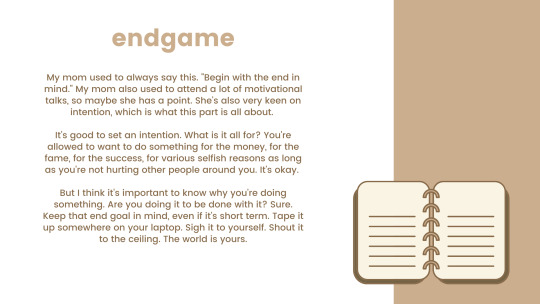

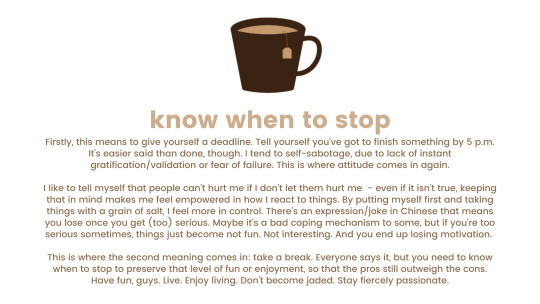
042420
As most people are working and studying from home right now, I wanted to share some concrete, implementable ways you can help yourself feel better. Though I believe productivity and quantity of work done (or lack thereof) doesn’t/shouldn’t translate into your self-worth and how you view yourself, when you get work done, you actually do feel better in your own body.
By the way, it’s the first time I’m formatting a tips/guide post like this, so I apologize that I couldn’t be more concise.
I’ve spoken to a licensed professional counsellor as well as to some professionals who have been working from home for a long time, and some of the advice above is from them. I’m also sharing from my own experience as someone who used to be very productive and an (ex-)overachiever, and still attach a lot of my self-worth to grades and other tangible accomplishments. I hope these slides can help you. In case it’s hard to read, I’ve included it (reworded) in text form if you’d like to read more.
Seguir leyendo
15K notes
·
View notes
Text


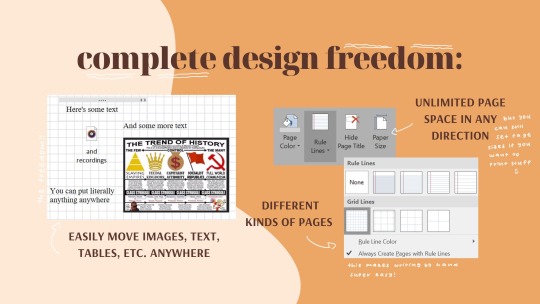
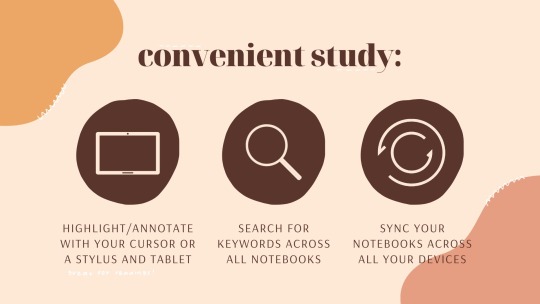
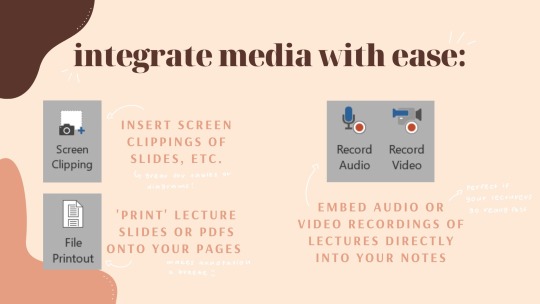
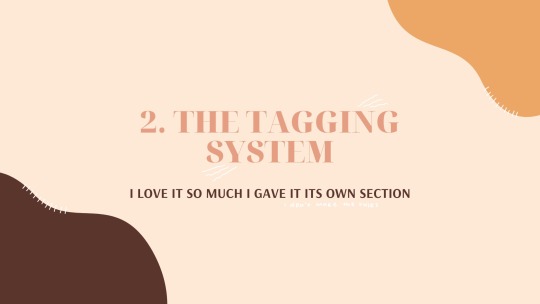
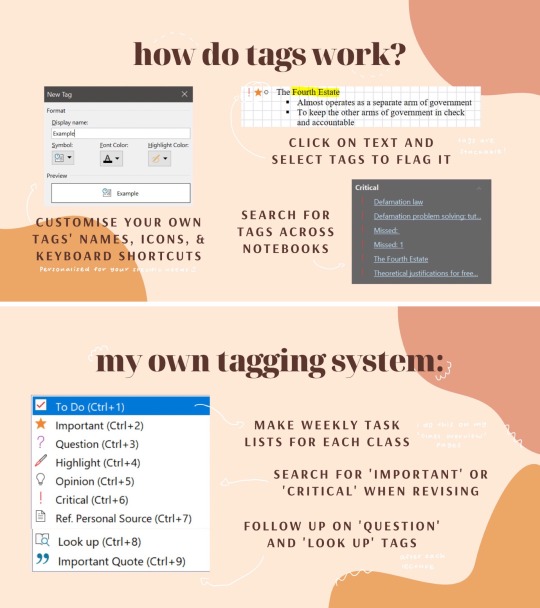
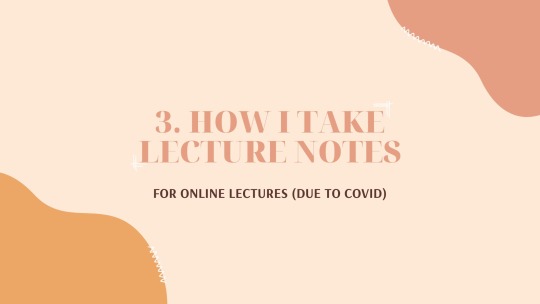

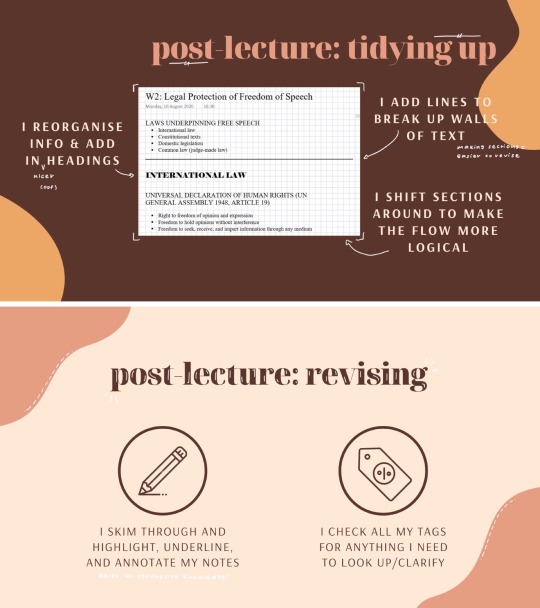
a few people have asked for a post on how i use onenote, so here’s a quick guide! also obviously not sponsored lol
7K notes
·
View notes
Photo




Am completely in love with these sticky notes!! Simple, but eye-catching in my notes! Hope you guys are having an amazing day :,)
♡ quick links
- these color swatch sticky notes
- etsy shop
- free printables, wallpapers, digital stickers!
♡ tag me! @annastudyskills | #annastudyskills
48 notes
·
View notes
Text
master list of advice posts
Hi everyone! I’ve made a lot of posts recently coming up to the school year so I wanted to compile everything I’ve made into one easy to access master list. This list will expand as I write more, of course.
general advice
how to study for a test
how to handle finals
why you should consider the 100dop challenge
college tips for freshmen
low maintenance bujo
specifically for premeds/science majors
what you should know about undergrad research
how to study for general biology
how to study for organic chemistry
how to study for general chemistry
college tips for first year premeds
mcat study tips
studying for biochemistry
approaching analytical chemistry
827 notes
·
View notes
Photo






NOTION FOR STUDENTS!!! One of my favourite organization apps that I have summarized breifly for you in this post!
I have also uploaded a blog post with all of the tips and tricks to get yourself set up as a Notion neewbie :D
314 notes
·
View notes
Photo

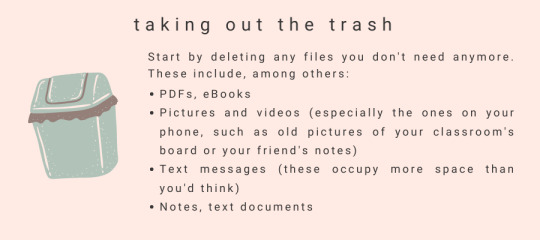
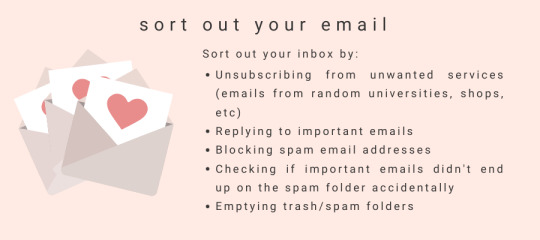


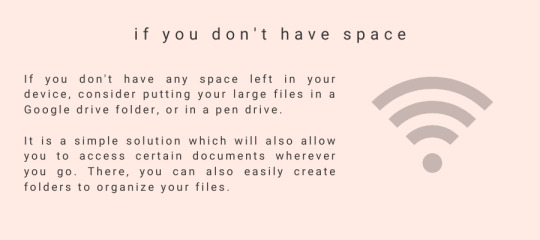
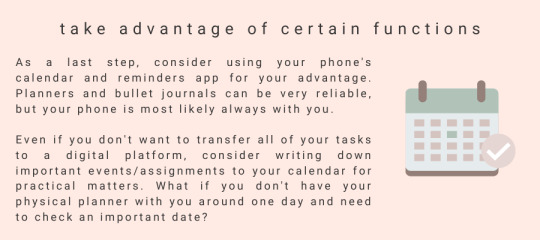
some easy to follow tips on how to organize your digital life for a stress-free experience while trying your best at school! ✨📖
other posts:
advice on choosing your major
self-studying in three steps
being productive at home
10K notes
·
View notes